Recherche avancée

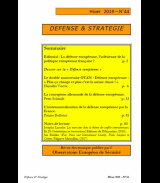 |
Double anniversaire OTAN - défense européenne: « Plus ça change et plus c’est la même chose ! »
Défense & Stratégie n°44, hiver 2019, pp.6-32
30 mars, 2020
Extrait: "Derrière les beaux discours sur « l’autonomie stratégique », la mise en œuvre oppose, comme toujours, le gaullisme résiduel de Paris à l’opinion majoritaire des partenaires qui tiennent à préserver, littéralement à tout prix, la primauté de l’Alliance atlantique. Jusqu’ici rien de nouveau. Sauf que la position française oscille – au pire moment, lorsque tous les événements la confortent pourtant – entre deux approches. Entre « intransigeance sur les principes » et « composer avec le réel », elle espère pouvoir ménager la chèvre et le chou. Autrement dit : avancer vers l’objectif d’émancipation européenne sans trop heurter le tropisme atlantiste-otanien de ses partenaires de l’UE – ce qui équivaut à la quadrature du cercle. Cette démarche a conduit à une extraordinaire confusion dans le discours du président Macron à l’Ecole de Guerre en février 2020, où il a réussi à placer dans un même paragraphe les deux visions antinomiques. D’un côté, il parle de « cette Europe de la défense, ce pilier européen au sein de l’OTAN », de l’autre il met les deux sur un pied d’égalité :« l’OTAN et l’Europe de la défense sont les deux piliers de la sécurité collective européenne » Tôt ou tard, il faudra choisir..."
|
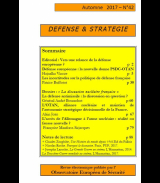 |
Défense européenne : la nouvelle donne PSDC-OTAN
Défense & Stratégie, Automne 2017, n°42, pp. 5-29
05 déc, 2017
Les turbulences dans le ciel européen et transatlantique durant l’année qui vient de s’écouler n’ont évidemment pas été sans incidence sur la cohabitation entre la Politique de sécurité et de défense commune (PSDC) de l’Union Européenne (UE) et l’Alliance atlantique. Les langues se délient, les initiatives se multiplient, de nouvelles perspectives semblent s’ouvrir et provoquent des contrecoups puissants. Quoi qu’il en soit, l’issue va dépendre, une fois de plus, des choix et de la détermination de la France.
|
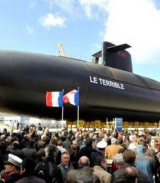 |
En cas de retrait US, un parapluie nucléaire « européen » ?
Note IVERIS
10 déc, 2016
D’après les informations de l’hebdomadaire allemand Der Spiegel (1), la question d’une alternative européenne à la (supposée) protection nucléaire américaine fait l’objet, depuis plusieurs mois, de discussions « informelles et off-the-record au quartier général de l’OTAN ».
|
 |
Suite aux attentats de Paris, l’Europe de la défense renaîtra-t-elle de ses cendres ?
Note IVERIS
18 nov, 2015
En évoquant à Versailles, pour la première fois dans l’histoire, la clause de défense mutuelle de l’UE, le Président François Hollande a donné un coup de fouet formidable à la défense européenne. Au vu de l’extraordinaire emprise des Etats-Unis et de l’OTAN sur la sécurité en Europe, il s’agit d’un véritable coup de force. Dans la foulée, la Haute Représentante de l’Union européenne lui a emboîté le pas sans hésiter.
|
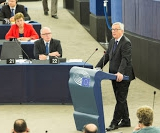 |
Juncker conteste-t-il, tout doucement, le monopole de l'OTAN?
Note IVERIS
11 sept, 2015
Dans une phrase peu aperçue de son discours sur « l’état de l’Union », le président de la Commission a repris une de ses idées fixes : les Etats membres de l’Union européenne devraient mutuellement (et naturellement) se porter assistance militaire dans le cadre d’une défense collective.
|
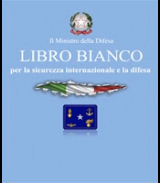 |
Le Livre blanc italien tente la quadrature du cercle
Note IVERIS
05 sept, 2015
La sécurité de l’Italie est « en premier lieu » assurée en coordination avec les partenaires de l’UE, alors que l’OTAN/ l’Amérique est mentionnée comme « la deuxième et la plus importante » garantie.
|
 |
La « guerre hybride » tombe à pic
Notes d’actualité, 18 mars, 2015
La dernière Lettre de la Représentation militaire de la France à l’UE aborde le concept de la « guerre hybride » (très en vogue à la suite de la crise russo-ukrainienne, comme si on venait de découvrir qu'une guerre se conduit sous des formes multiples, dans des dimensions à la fois militaires et civiles). La conclusion que l’on en tire est édifiante à plus d'un titre.
|
 |
La France, quel gardien du temple pour l'Europe de la défense?
Notes d’actualité, 20 nov, 2014
« C’est la PSDC – ou vivre dans un monde dirigé par d’autres », ce constat limpide fut la réplique de l’ancien patron de l’Agence européenne de défense, Nick Witney, à un article qui préconisait d’oublier la PSDC (la politique de sécurité et de défense commune de l’UE) et de nous en remettre plutôt à la seule Alliance atlantique. Le constat est à moitié exact. L’enjeu, c’est en effet la sauvegarde (ou pas) de notre liberté de choix. Mais faire de la PSDC le dépositaire de cette ambition, ce serait ignorer profondément son évolution.
|
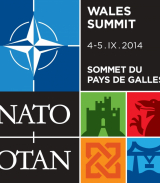 |
L'Alliance atlantique face à la crise ukrainienne (Bilan du sommet de l OTAN au pays de Galles)
Défense & Stratégie n°36, automne 2014
13 nov, 2014
Quelques extraits de l’article « L’Alliance atlantique face à la crise ukrainienne : la réatlantisation de l’Europe (Blian du sommet de l'OTAN au pays de Galles) », qui vient de paraître dans la Revue Défense & Stratégie.
« D’après le discours officiel, le sommet de 2014 de l’Alliance aurait « largement changé d’orientation » à la suite de la crise russo-ukrainienne. En réalité, chacune des supposées nouvelles orientations, chacun des soi-disant changements (tous liés, d’une manière ou d’une autre, au retour en force de la défense collective à travers l’article 5) n’est que la reprise de thèmes et la réaffirmation de priorités qui avaient été prévus depuis longtemps. »
|
 |
Petites perles du mois écoulé – compilation des entrées Google+ (octobre 2014)
Brèves, 02 nov, 2014
Défense européenne
1. La note récente du European Council on Foreign Relations porte un jugement sans appel sur la politique commune de défense et de sécurité de l’Union européenne.« Dans l’état actuel des choses, la PSDC fait plus de mal que de bien – à la réputation de l’UE, et à la contribution à la sécurité globale que les Etats membres pourraient apporter » sous d’autres enseignes. Et le principal coupable ? L’approche globale. « La doctrine de l’approche globale a constitué un écran de fumée derrière lequel la politique commune de défense et de sécurité de l’UE s’est, pour ainsi dire, écroulée ».
|
 |
Petites perles de la semaine écoulée - compilation des entrées Google+ (4 mai 2014)
Brèves, 04 mai, 2014
Industries d’armement
1. « L’Europe de la défense est dans un état épouvantable », observe le président d’Airbus Group, Tom Enders, devant le Conseil Atlantique. Merci à qui ? A M. Enders et compagnie (tant parmi les financiers-industriels que parmi les politiques). Ce sont eux qui nous avaient engagés dans la voie de l’érosion/transatlantisation en refusant obstinément d’instaurer la préférence européenne, et en faisant valoir, en Europe même, la consigne « Buy American ». Ou en « normalisant » les groupes d’armement (le terme désigne, dans le novlangue européen, l’éviction de l’Etat de l’entreprise et, avec lui, la négation, par principe, de toute considération politico-stratégique). Ou en cherchant à se déresponsabiliser toujours davantage sous couvert de « spécialisations » et de fusions en tout genre. Ou encore en jugeant que l’adjectif « européen » est un gros mot dont il convient de débarrasser EADS au plus vite, afin de ne pas compromettre ses mirobolantes chances en Amérique.
|
 |
Petites perles de la semaine écoulée – compilation des entrées Google+ (13 avril 2014)
Brèves, 13 avril, 2014
Géopolitique
Dans le prochain numéro de Time, Robert D. Kaplan parle de « la revanche de la géographie ». Notamment en faisant le constat que « La géographie n’a pas disparu. L’élite globalisée – les universitaires, intellectuels, analystes des relations internationales, les patrons de fondations et les puissants du monde des affaires, de même que beaucoup de dirigeants occidentaux – ont pu largement l’avoir oubliée. Mais ce à quoi nous assistons aujourd’hui, c’est la revanche de la géographie ».
|
 |
Pacte Défense Cyber : gare aux alliances !
Theatrum Belli
02 mars, 2014
Le Ministère de la défense a présenté récemment son « Pacte Défense Cyber », un plan d’action en 50 points pour cadrer ses actions en matière de cyberdéfense. Jusqu’ici, rien de plus normal, il s’agit évidemment d’un enjeu d’importance cruciale. Toutefois, ce qui retient immédiatement l’attention, c’est la tension (voire contradiction) entre d’une part l’impératif de souveraineté dans ce domaine hautement stratégique et, de l’autre, l’insistance du Pacte sur des cadres de coopération internationale où, c’est le moins que l’on puisse dire, les partenaires de la France ne partagent pas forcément ce souci.
|
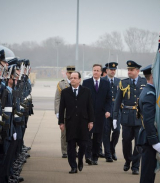 |
L’Europe de la défense, éternelle pomme de la discorde entre la France et le Royaume-Uni
Notes d’actualité, 31 janv, 2014
Au récent sommet franco-britannique, en plein milieu des annonces concernant la coopération militaire bilatérale, le président Hollande a frôlé le crime de lèse-majesté, en osant prétendre que « Le drone de combat préfigure ce que pourrait être une Europe de la défense ». Pour les Britanniques, coopérer, pourquoi pas, mais n'évoquons surtout pas l'Europe, et en particulier pas en l'associant aux questions de défense.
|
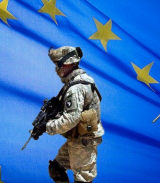 |
Pente glissante : la réatlantisation de l Europe de la défense
The Federalist Year LV, 2013
31 déc, 2013
La réatlantisation de l’Europe de la défense est en marche.[1] Que ce soit la crise en Ukraine, offrant visiblement un formidable prétexte aux efforts de rebond de l’OTAN ; ou notre inexorable enfermement dans le piège de la coopération avec l’Amérique en matière d’armement ; ou les pressions qui s’accentuent pour civilianiser la PSDC y compris ses groupements tactiques ; ou encore le nouveau discours de symbiose transatlantique ; il s’agit à chaque fois de manifestations palpables d’un choix délibéré de la part des élites euro-occidentales. Un choix qui va pourtant à contre-courant de ce que dicteraient les événements, le bon sens, nos intérêts et notre dignité. Sans parler du désir (assez peu perceptible, il faut le dire) de tenir, tant bien que mal, notre place dans la « mêlée mondiale »
|
 |
Analyse à chaud : le rapport Ashton sur la défense européenne 3. (propositions concrètes, opérations militaires)
Notes d’actualité, 17 oct, 2013
Les mesures concrètes proposées dans le rapport Ashton afin d’améliorer la capacité de réaction rapide de l’UE aux crises ne sont guère surprenantes. Par contre un seul élément, le plus important, surprend par son absence. Il s’agit du vieux serpent de mer du Quartier général militaire européen (pour la planification et la conduite des opérations UE), dont la nécessité est aujourd’hui reconnue de tous, sauf le Royaume-Uni qui en fait sa ligne rouge. Le rapport n’en dit même pas un mot. Or s’il y a une mesure susceptible à la fois de réduire le temps de réaction aux crises, d’assurer la continuité, de permettre un véritable retour d’expérience et de supprimer les doublons entre 5 structures nationales différentes ; cette mesure est bien celle-là. Dommage de la passer sous silence.
|
 |
Analyse à chaud : le rapport Ashton sur la défense européenne 2. (relations UE-OTAN)
Notes d’actualité, 16 oct, 2013
Le paragraphe consacré aux relations UE-OTAN est un classique du genre. Il préconise toujours plus de coopération, en tissant des liens toujours plus étroits entre l’UE et l’Alliance. Ce qui n’est pas un mal en soi. Sauf quand on connaît ce qu'il y a derrière ces formules toutes faites. Rappelons qu’au lancement de la PSDC (la politique de sécurité et de défense commune de l’UE), la France était extrêmement vigilante à ne pas laisser « la fleur délicate de la défense européenne se faire écraser dans une embrassade avec le géant militaire qu’est l’OTAN ». A l’époque, même une étude du Center for European Reformbritannique admet, tout en prêchant pour l’inverse, que « les inquiétudes françaises vis-à-vis des priorités US ne sont pas complètement sans fondement ».
|
 |
Le rapport Ashton sur la PSDC: à la fois trop ambitieux et pas assez
Notes d’actualité, 16 oct, 2013
On dit souvent de la défense européenne qu’elle est en hibernation depuis un bon moment. Eh bien, elle ferait mieux d’y rester, plutôt que d’être ressuscitée sur la base du rapport que la Haute représentante vient de présenter en vue du sommet de décembre. Car ledit rapport essaie de cacher son manque d’ambition réelle pour la PSDC (politique de sécurité et de défense commune de l’UE) derrière des initiatives qui, dans ce cadre, ne pourront faire que des dégâts. Mais soyons justes. Accordons-lui au moins d’avoir fait le bon constat. En effet, les trois explications que le rapport avance au départ pour justifier l’importance des efforts de défense sont tout à fait valables (à savoir l’aspect politique pour ce qui est du rôle de l’Europe sur la scène mondiale ; opérationnel quant à disposer de la capacité militaire d’agir le cas échéant ; économique enfin pour soutenir l’innovation, l’emploi et la croissance).
|
 |
L'A400M dans une optique américaine
Notes d’actualité, 02 oct, 2013
Certes les Etats-Unis ne pourront pas ne pas se réjouir officiellement, en voyant leurs alliés commencer à combler l'une des principales lacunes capacitaires qu'ils leur reprochent depuis si longtemps. Mais ce n'est que la façade. L'A400M est un concurrent et un outil d’autonomie européenne comme ils ne les aiment pas. Un article du Washington File du Département d’Etat datant de 2006 précise déjà que « Les US recommandent aux alliés OTAN de mettre en commun de l’argent pour acheter des C-17 ». Une solution présentée comme bénéfique pour les affaires de Boeing et qui serait du même coup la meilleure façon de pallier les carences des Européens en matière de transport stratégique.
|
 |
L'A400M dans une optique européenne
Notes d’actualité, 02 oct, 2013
Comme l'a dit Hervé Morin, ministre de la défense en 2010: «L'A400M est un programme emblématique sur lequel les Européens ne pouvaient pas renoncer ». En effet, son arrivée signifie plus pour la « défense européenne » que n'importe quelle déclaration pompeuse à l'issue d'une quelconque réunion au sommet. Premièrement, parce que la nouvelle flotte d'avions de transport stratégique (et tactique, l'A400M étant hautement polyvalent) va résorber ce qui fut identifiée comme l'une des lacunes capacitaires majeures de l'Europe de la défense, dès le lancement de celle-ci il y a déjà quinze ans.
|
 |
Lectures de la semaine (25 août 2013)
Brèves, 25 aout, 2013
Les fidèles Britanniques ont eu droit à un énième camouflet de la part de leurs « cousins » d’outre-Atlantique, cette fois-ci sous la forme d’une petite pique du porte-parole de la Maison Blanche qui a publiquement pris ses distances avec les autorités du Royaume-Uni. En affirmant, sans rire, à propos de la destruction des disques durs du journal Guardian contenant les fuites sur les programmes de surveillance UK-US (Tempora/PRISM), qu’il « est difficile d’imaginer un scénario dans lequel ce serait approprié ».
|
 |
Lectures de la semaine (4 août 2013)
Brèves, 03 aout, 2013
Le Service européen d'action extérieure (SEAE) vient d'apporter à son tour une première pierre au sommet « Défense » de décembre. Notamment sous la forme d’un rapport, intitulé « Révision stratégique », sur sa propre organisation et fonctionnement.
|
 |
Etat des lieux de la défense européenne
Az EU biztonság és védelempolitikai dokumentumai 3
19 déc, 2005
Le présent papier au sujet de la politique de sécurité et de défense de l’Union européenne (PESD) fait un bref tour d’horizon sur 1. Les développements de l’an 2005 ; 2. Opinion publique et contrôle démocratique ; 3. Industries et technologies d’armement ; 4. Gestion civile des crises ; 5. Coopération avec l’ONU.
|
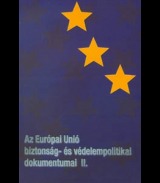 |
Les perspectives d'une culture stratégique européenne commune
Az EU biztonság- és védelempolitikai dokumentumai 3 (ed. J. Takács - P. Tálas - H. Vincze)
01 déc, 2005
La présente étude commence par examiner le concept de « culture stratégique », avant de tenter de dresser l’inventaire des nombreuses lignes de fracture divisant les Etats membres de l’UE dans ce domaine. Pour conclure, elle se focalise sur les forces qui permettent ou empêchent de surmonter ces divergences. En soulignant tout au long que la véritable question ne concerne pas la faisabilité d’une éventuelle synthèse, mais plutôt sa substance. Autrement dit, il s’agit de savoir si une culture commune européenne en matière de sécurité pourra-t-elle jamais avoir un contenu réellement stratégique.
|
 |
Les relations UE-OTAN: entre coopération nécessaire, compétition inhérente et l’inéluctable changement de paradigme
Az Észak-atlanti Szerződés Szervezete a változás korában
15 aout, 2005
Les relations UE-OTAN ne sont qu’un symptôme. Elles reflètent d’un côté l’épreuve de force entre les deux rives de l’Atlantique et, de l’autre, la schizophrénie intra-européenne. Au centre de ce bras de fer complexe, il y a une seule question cruciale et un seul véritable enjeu : l’autonomie européenne. Pour ce qui est du prétendu choix à faire entre coopération ou compétition UE-OTAN, c’est un faux dilemme. Dans l’état actuel des rapports de force, les deux sont inévitables.
|
 |
Les nouveautés du traité constitutionnel en matière de politique de sécurité et de défense
Eszmélet n°64. November 2004
01 nov, 2004
La politique de sécurité et de défense est le domaine où le nouveau traité de l’Union, baptisé « Constitution », contient le plus d’infléchissements positifs. Ces nouveautés sont cruciales quel que soit le sort immédiat de la "Constitution": ils démontrent le point d'équilibre délicat entre l'exigence minimale pour un fonctionnement efficace et le degré maximum de volonté politique au niveau des Vingt-Cinq.
|
|
 |
Les plus lus


|



